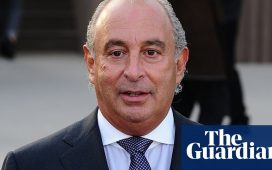Cassie Ventura and Sean ‘Diddy’ Combs attend the Heavenly Bodies: Fashion & The Catholic Imagination Costume Institute Gala at The Metropolitan Museum of Art on May 7, 2018 in New York City.
John Shearer | Getty Images | The Hollywood Reporter | Getty Images
Hip-hop music and fashion mogul Sean “Diddy” Combs was hit Thursday with a civil lawsuit accusing him of raping and sex trafficking singer Cassie, his former romantic partner, over the course of a decade.
In addition to Combs, the suit names Bad Boy Records, Bad Boy Entertainment, Epic Records and Combs Enterprises as defendants.
Combs, one of the most influential and successful executives in music, founded Bad Boy in the early 1990s. He also launched a clothing label, Sean John, and developed the Ciroc vodka brand. As recently as last year, Forbes estimated his net worth at $1 billion.
“After years in silence and darkness, I am finally ready to tell my story, and to speak up on behalf of myself and for the benefit of other women who face violence and abuse in their relationships,” Cassie said in a statement about her bombshell suit, filed in U.S. District Court in Manhattan.
“With the expiration of New York’s Adult Survivors Act fast approaching, it became clear that this was an opportunity to speak up about the trauma I have experienced and that I will be recovering from for the rest of my life,” said Cassie, whose legal name is Casandra Ventura.
The Adult Survivors Act since last November allows accusers a one-year window to file civil claims of sexual abuse that otherwise would be barred by the statute of limitations.
Combs “vehemently denies these offensive and outrageous allegations,” his lawyer Ben Brafman said in a statement.
“Ms. Ventura’s demand of $30 million, under the threat of writing a damaging book about their relationship, was unequivocally rejected as blatant blackmail,” Brafman said. “Despite withdrawing her initial threat, Ms. Ventura has now resorted to filing a lawsuit riddled with baseless and outrageous lies, aiming to tarnish Mr. Combs’ reputation, and seeking a pay day.”
Cassie’s lawyer, Douglas Wigdor, shot back that Combs “offered Ms. Ventura eight figures to silence her and prevent the filing of this lawsuit. She rejected his efforts and decided to give a voice to all woman who suffer in silence.”
“Ms. Ventura should be applauded for her bravery,” Wigdor added. “No human should have to endure what Ms. Ventura has endured.”
Cassie’s accusations
Cassie’s suit says that in 2005, when she was 19 years old, the then 37-year-old Combs lured the singer into a professional relationship by signing her to his label, Bad Boy Records.
Within several years he induced her into a sexual relationship, and introduced her “to a lifestyle of excessive alcohol and substance abuse and required her to procure illicit prescriptions to satisfy his own addictions,” the suit alleges.
The suit claims that Combs raped Cassie in her home after she tried to leave him, “blew up” another man’s car after learning of his romantic interest in the singer, and often beat and kicked her.
And it says Combs “forced Ms. Ventura to engage in sex acts with male sex workers while masturbating and filming the encounters.”
“Throughout their relationship Mr. Combs was prone to uncontrollable rage, and frequently beat Ms. Ventura savagely,” the suit alleges.
“These beatings were witnessed by Mr. Combs’ staff and employees of Bad Boy Entertainment and Mr. Combs’s related businesses, but no one dared to speak up against their frightening and ferocious boss.”
Cassie’s suit is the latest legal challenge for Combs. Earlier this year, he sued Ciroc owner Diageo for alleged racial discrimination, saying they neglected Ciroc and his tequila brand, DeLeon. The company ended their relationship in June after about 16 years.
Combs also was a close friend of rapper Notorious B.I.G., known as Biggie. He was in Biggie’s entourage, in a separate vehicle, when the rapper was fatally shot in 1997.
— Additional reporting by Stefan Sykes and Mike Calia











